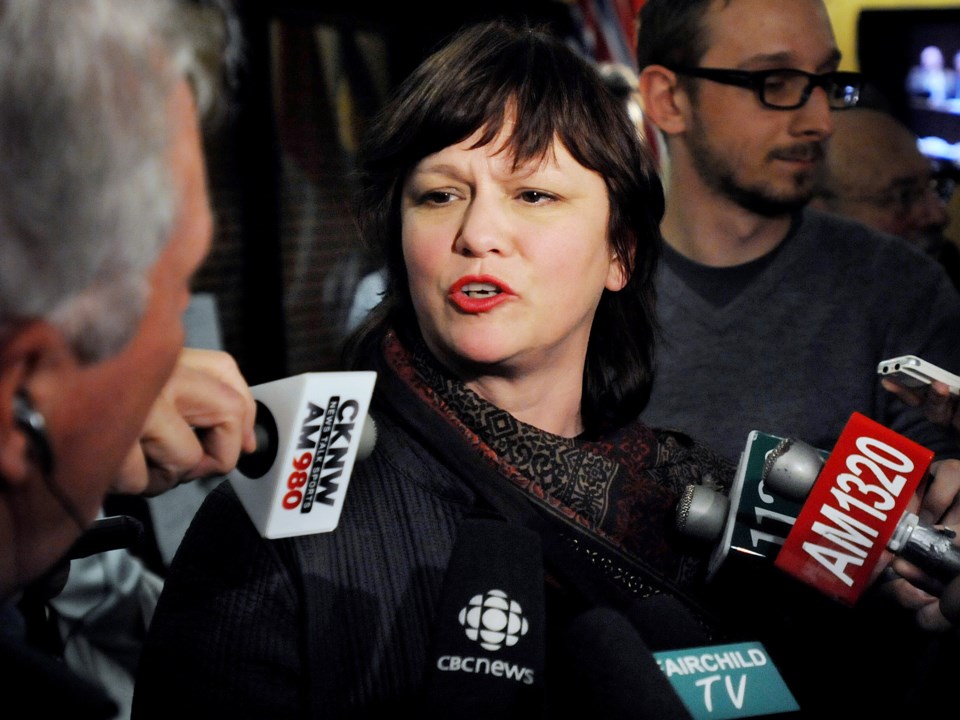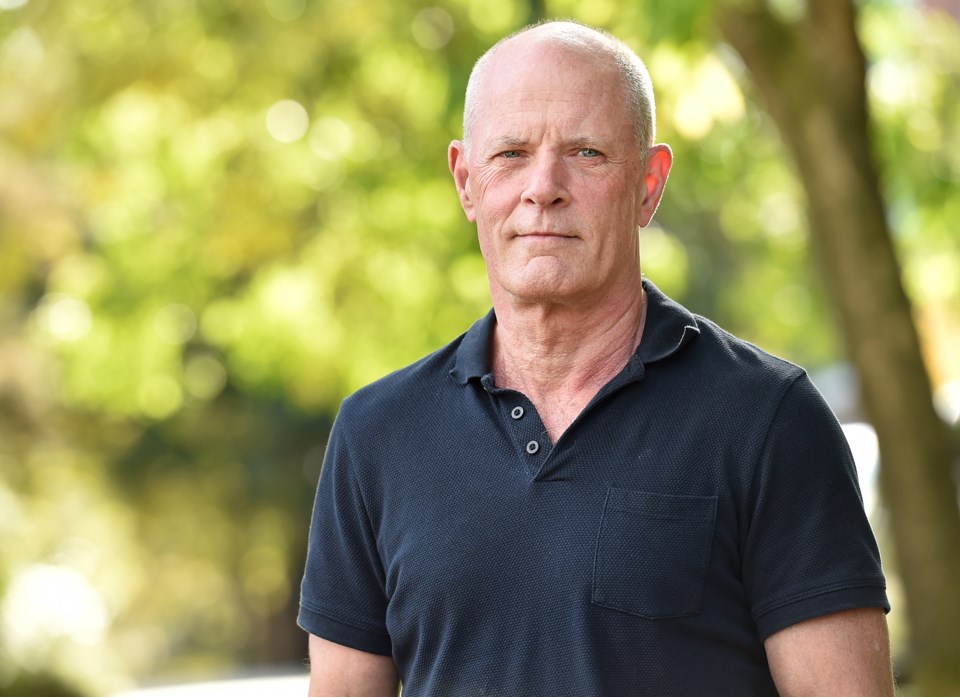Election after election in Vancouver, the result has for the most part remained the same — political parties and their candidates obliterate any chance of independents winning a seat, no matter the person’s profile in the city.
Take Sandy Garossino’s experience, for example.
In 2011, the former Crown prosecutor chose to run as an independent for council. She had a huge media profile at the time for leading the charge against Paragon Gaming Inc.’s proposal to substantially increase the number of gaming tables and slot machines at what became its new casino, Parq, adjacent to B.C. Place Stadium.
Garossino was a co-founder of the Vancouver Not Vegas coalition that included former politicians, retired police officers and judges, artists and religious leaders. She was on the front page of newspapers, appeared on radio shows and was a familiar face on television news.
City council rejected Paragon’s bid in April 2011. People praised Garossino and the coalition for their work. Eight months later, Garossino’s name was on the election ballot. She placed 22nd in the council race, winning 20,866 votes, enough to fill Rogers Arena.
It was, by far, the best showing among independent candidates. But Garossino would have needed more than double the number of votes she received to win a seat.
So why didn’t she run with a party?
“Because I really wanted to raise the issue about foreign capital entering the real estate market and what that was going to do to housing affordability, and none of the parties wanted to address that,” she recalled last week. “They were all really afraid to touch that.”
Vision Vancouver won another majority that year, with George Affleck and Elizabeth Ball winning two seats for the NPA and the Greens’ Adriane Carr narrowly securing the 10th council spot with 48,648 votes.
The biggest factor against a Garossino victory was the party machines of Vision Vancouver and the NPA, which raised millions of dollars from businesses and unions to fund their candidates’ campaigns; she spent $35,000 on her run.
Both parties also had well established brands, which likely helped candidates with lesser profiles than Garossino win votes. Anyone remember Joe Carangi, or Francis Wong?
Both NPA candidates received more than 41,000 votes in the council race.
“I had great media interest that year — just phenomenal,” Garossino said. “You might be on the front page of a newspaper, but the average person isn’t really paying attention. I think that’s even more so now, but then there’s less money now in politics. That is really showing up and I think the inability of the parties to dominate in that way is really opening a door. I think it’s great.”
What Garossino was referring to is the new campaign finance laws that ban union and corporate money and limit individual donations to $1,200; third-party advertising, however, still allows the spending of an unlimited amount of money prior to a campaign period, which began Sept. 22 -- after billboards around town displayed support for Yes Vancouver mayoral candidate Hector Bremner.
The Vancouver and District Labour Council also paid for 100,000 flyers promoting independent mayoral candidate Kennedy Stewart and 26 other candidates.
Finance reform, coupled with Mayor Gregor Robertson and the majority of his council team retiring, are factors Garossino believes could give rise to the election of one or more independent candidates this time around.

Poll supports election of independents
A recent Research Co. poll supports Garossino’s belief, with 39 per cent of respondents saying they will “definitely” or “probably” cast ballots for independent candidates. A total of 49 independent candidates are campaigning to be elected as mayor, councillor, school board trustee or park board commissioner.
Still, the brands of the NPA and Vision Vancouver persist. The Greens have also emerged as a force, with representatives on council, school board and park board. A total of 11 political parties, including COPE, OneCity, Coalition Vancouver, ProVancouver, Vancouver First and Yes Vancouver, are running candidates in the Oct. 20 election.
“Generally speaking, I think that is true — brands do carry the day,” Garossino said. “But I think right now, the brands are weakened. Vision is a weaker brand and the NPA always has to throw a huge amount of money to establish their brand. I think the brands themselves are suffering, independent of the campaign finance rules.”
Though Mrs. Doubtfire and Spike are among the mix of independents running this year, there is a long list of independents whose names are familiar to city hall watchers and either have previous political experience or are known for work in their community.
That includes mayoral candidates Kennedy Stewart, the former Burnaby-South NDP MP, and Shauna Sylvester of the SFU Centre for Dialogue, who was a Vision Vancouver board member when Garossino ran in 2011.
At the council level, independent candidates of note include former Vision park board commissioner Sarah Blyth, who has been on the frontlines of the opioid crisis, and former Vancouver Police Board member Wade Grant of the Musqueam Indian Band.
Also on the council ballot are Adrian Crook of Abundant Housing Vancouver, who blogs about living with five kids in a condo, former NPA school trustees Penny Noble and Barbara Buchanan, park board commissioner Erin Shum and former NPA candidate Rob McDowell, a long-time diplomat and member of Vancouver’s LGBTQ advisory committee.
Another factor in this year’s race is the ballot itself. Last Friday, the city held a draw to randomly choose the order of candidates. It was done because of concerns that voters tend to vote for the top names on a ballot, which have for several elections been listed in alphabetical order.
On this year’s ballot, only one candidate affiliated to a party is listed in the top nine choices for mayor. In fact, only six parties are represented among the 21 candidates. Five of the first 10 names on the council ballot are independents.
Vision Coun. Heather Deal, whose name was always near the top of the ballot in previous elections, is last on the list of 71 candidates vying for 10 spots on council. NPA Coun. Melissa De Genova, like previous years, is near the top of the ballot in the fourth spot.
Independents would appear to have less of a chance at getting elected to the nine-person school board (five independents among 33 candidates) and seven-person park board (three independents among another 33 candidates).
But never say never, said Garossino, who “would love nothing more than to see” an independent elected, although she was quickly reminded what she said earlier about people not paying attention to municipal politics.
“I could be falling to prey to what I described. Political junkies see things, but the average person on the street — the average voter — doesn’t.”

Independent council candidate elected in 1986
Back in 2011, before Garossino launched her campaign, she met for coffee with Gordon Price, who was an NPA city councillor from 1986 to 2002. Price talked to Garossino about her decision to run as an independent.
“She was absolutely adamant about running [as an independent], and I always thought that was such a loss,” said Price, the past director of the City Program at Simon Fraser University and current fellow at the Morris J. Wosk Centre for Dialogue. “She’d make a great councillor, maybe a great mayor. But, no, she was insistent on running as an independent, and it went nowhere.”
He recalled that Carole Taylor was the last independent council candidate to get elected to council. That occurred in 1986 — the same year Price was first elected — but came after Taylor was left off the NPA’s candidate list and forced to run as an independent. The last independent mayor to get elected was Mike Harcourt in 1980, although he had the support of COPE.
A keen observer of local politics, Price is unable to predict what will unfold in next month’s election. There is evidence, however, that some independents could get elected, he said, citing many of the same reasons Garossino did.
“The conditions seem to be as good as they’ve ever been for the possibility of independents to win,” Price said. “You have so many vacancies, the new [finance] rules don’t give the parties as much of an edge as they did before — an edge, hell, an electoral bulldozer — and there are some good people running. Depending on your taste, there’s something on the menu for pretty much everyone.”
That said, he noted the election of a variety of independents could create chaos in the council chamber.
“If people think that the free flow of ideas and exchange is something they would like, they will get very tired of what just appears to be argumentative back-and-forth, and no consistent governance,” Price said. “And that’s where I think the toleration for this would be pretty limited, unless a group of people get together to form a coalition that effectively becomes a party so they can govern, and you’re kind of back where you started.”
There’s a reason, Price said, that parties exist at all levels of government — and that’s to bring like-minded people together to create an identity or brand and govern.
“If you have a council of independents — and we can see this in other municipalities around the region where the party system is not in play — they very quickly find out who, more or less, falls within the same ideological or political direction that they want to take and they become a de facto party,” he said
Price said he is not encouraged by what he is hearing from people he speaks to about this election. Many are confused and not genuinely interested — factors that could lead to a low voter turnout, which could give an edge to candidates affiliated with parties, he said.
“I ask people all the time, ‘Where is the election at the moment?’ Almost universally, people say they’re confused — there’s too many parties, they all sound the same, there’s too many people, I don’t know them and frankly I’m not seeing anything in my day to day, and not really paying attention.”
The election is Oct. 20.
@Howellings



